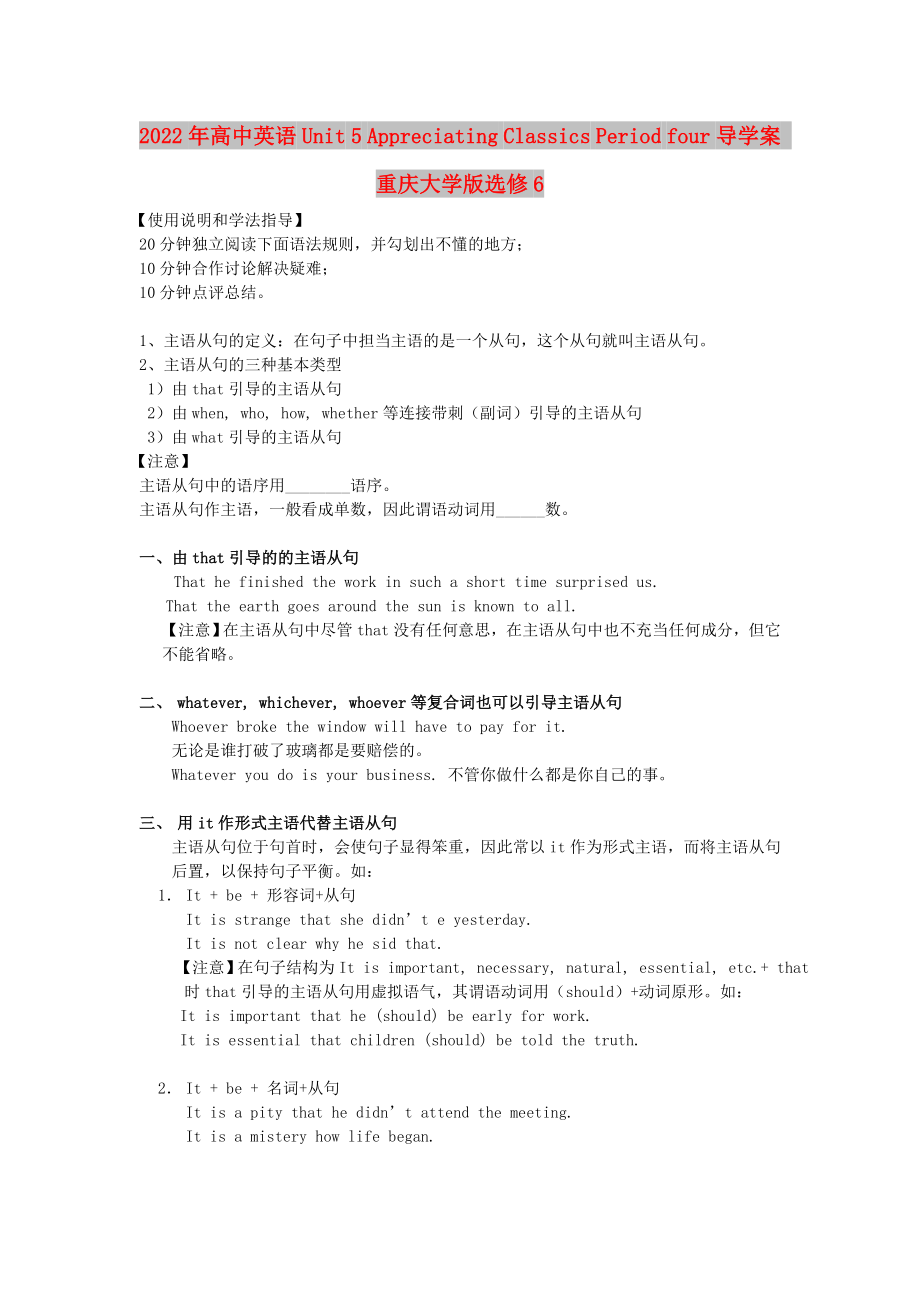《2022年高中英語(yǔ) Unit 5 Appreciating Classics Period four導(dǎo)學(xué)案 重慶大學(xué)版選修6》由會(huì)員分享,可在線閱讀,更多相關(guān)《2022年高中英語(yǔ) Unit 5 Appreciating Classics Period four導(dǎo)學(xué)案 重慶大學(xué)版選修6(3頁(yè)珍藏版)》請(qǐng)?jiān)谘b配圖網(wǎng)上搜索�。
1、2022年高中英語(yǔ) Unit 5 Appreciating Classics Period four導(dǎo)學(xué)案 重慶大學(xué)版選修6
【使用說(shuō)明和學(xué)法指導(dǎo)】
20分鐘獨(dú)立閱讀下面語(yǔ)法規(guī)則�,并勾劃出不懂的地方;
10分鐘合作討論解決疑難�;
10分鐘點(diǎn)評(píng)總結(jié)。
1�、主語(yǔ)從句的定義:在句子中擔(dān)當(dāng)主語(yǔ)的是一個(gè)從句,這個(gè)從句就叫主語(yǔ)從句�。
2、主語(yǔ)從句的三種基本類(lèi)型
1)由that引導(dǎo)的主語(yǔ)從句
2)由when, who, how, whether等連接帶刺(副詞)引導(dǎo)的主語(yǔ)從句
3)由what引導(dǎo)的主語(yǔ)從句
【注意】
2�、主語(yǔ)從句中的語(yǔ)序用________語(yǔ)序。
主語(yǔ)從句作主語(yǔ)�,一般看成單數(shù),因此謂語(yǔ)動(dòng)詞用______數(shù)�。
一、由that引導(dǎo)的的主語(yǔ)從句
That he finished the work in such a short time surprised us.
That the earth goes around the sun is known to all.
【注意】在主語(yǔ)從句中盡管that沒(méi)有任何意思�,在主語(yǔ)從句中也不充當(dāng)任何成分,但它不能省略�。
二、 whatever, whichever, whoever等復(fù)合詞也可以引導(dǎo)主語(yǔ)從句
Whoever broke t
3�、he window will have to pay for it.
無(wú)論是誰(shuí)打破了玻璃都是要賠償?shù)摹?
Whatever you do is your business. 不管你做什么都是你自己的事。
三�、 用it作形式主語(yǔ)代替主語(yǔ)從句
主語(yǔ)從句位于句首時(shí),會(huì)使句子顯得笨重�,因此常以it作為形式主語(yǔ)�,而將主語(yǔ)從句后置�,以保持句子平衡�。如:
1. It + be + 形容詞+從句
It is strange that she didn’t e yesterday.
It is not clear why he sid that.
【注意】在句子結(jié)構(gòu)為It is
4、 important, necessary, natural, essential, etc.+ that時(shí)that引導(dǎo)的主語(yǔ)從句用虛擬語(yǔ)氣�,其謂語(yǔ)動(dòng)詞用(should)+動(dòng)詞原形。如:
It is important that he (should) be early for work.
It is essential that children (should) be told the truth.
2. It + be + 名詞+從句
It is a pity that he didn’t attend the meeting.
It is a mistery how
5�、life began.
3. It + be + 動(dòng)詞+從句
It doesn’t matter when he will arrive.
4. It +被動(dòng)語(yǔ)態(tài)+從句
It is said that he is your uncle.
類(lèi)似結(jié)構(gòu):It is reported/believed/well-known + that
【注意】whther與if引導(dǎo)主語(yǔ)從句的區(qū)別
if在句首不可以引導(dǎo)主語(yǔ)從句,只能用whether�,但是如果是用形式主語(yǔ)it,那么whether和if否可以用�。如:
Whether she es or not makes no
6�、 difference. (不能用if)
她來(lái)不來(lái)都沒(méi)有關(guān)系�。
It is doubtful whether/if the President knew the details of the plan.
總統(tǒng)是否知道這個(gè)計(jì)劃的細(xì)節(jié)這一點(diǎn)頗有疑問(wèn)�。
名詞性從句:賓語(yǔ)從句
1�、賓語(yǔ)從句的定義:在句子中擔(dān)當(dāng)賓語(yǔ)的是一個(gè)從句�,這個(gè)從句就叫賓語(yǔ)從句�。
賓語(yǔ)從句在句中作及物動(dòng)詞或介詞的賓語(yǔ)�。
2、賓語(yǔ)從句的三種類(lèi)型
1)由that引導(dǎo)的賓語(yǔ)從句
2)由wh-/how詞引導(dǎo)的賓語(yǔ)從句
3)由whether�,if引導(dǎo)的賓語(yǔ)從句
【注意】賓語(yǔ)從句中的語(yǔ)序
7�、用________語(yǔ)序�。
一、 由that引導(dǎo)的賓語(yǔ)從句
We didn’t know (that) Billy would jump.
She told me (that) she broke her arm.
【注意】
1�、賓語(yǔ)從句中國(guó)的連接詞that在口語(yǔ)或非正式文體中可以省略。在下列情況中連接詞that不能省略:
① 句中的動(dòng)詞后接兩個(gè)或兩個(gè)以上的that從句作賓語(yǔ)時(shí)�,第一個(gè)that可省,但后面的that不可省。
She said (that) she broke her arm and that she would go to hospita
8�、l.
② 當(dāng)that從句時(shí)雙賓語(yǔ)中的直接賓語(yǔ)時(shí),that不可省�。如:
I must never tell anyone that I could not see the cloth.
③ 當(dāng)that賓語(yǔ)從句前有it作形式賓語(yǔ)時(shí)�,that不可省。如:
We think it important that we study hard.
2�、使用賓語(yǔ)從句時(shí)應(yīng)注意時(shí)態(tài)呼應(yīng)。
① 主句謂語(yǔ)動(dòng)詞是現(xiàn)在時(shí)態(tài)或?qū)?lái)時(shí)�,從句謂語(yǔ)動(dòng)詞可以用任何所需要的時(shí)態(tài)。如:
I’m sure that you’ll pass the exam.
②
9�、 主句謂語(yǔ)動(dòng)詞是過(guò)去時(shí)態(tài),從句謂語(yǔ)動(dòng)詞用相應(yīng)的過(guò)去式�。如:
He said he would visit his parents the next day.
③ 從句所說(shuō)明的是一般真理或客觀事實(shí),即使主句用過(guò)去時(shí)�,從句仍用一般現(xiàn)在時(shí)。如:
The teacher told us that the earth moves around the sun.
④ 由whether�,if引導(dǎo)的賓語(yǔ)從句
I wonder whether/if she will stay.
He asked me whether/if my brother was at home.
 2022年高中英語(yǔ) Unit 5 Appreciating Classics Period four導(dǎo)學(xué)案 重慶大學(xué)版選修6
2022年高中英語(yǔ) Unit 5 Appreciating Classics Period four導(dǎo)學(xué)案 重慶大學(xué)版選修6

